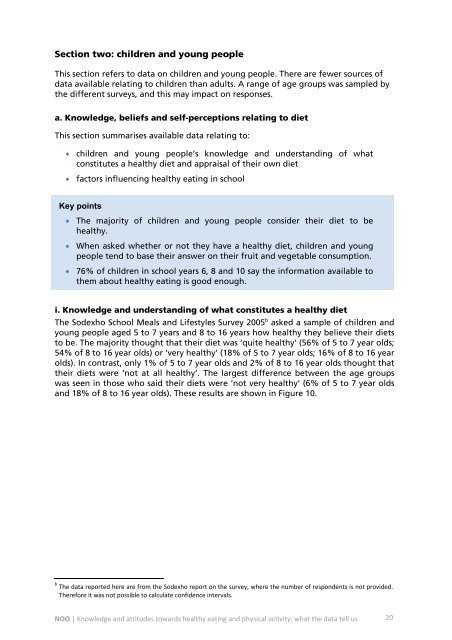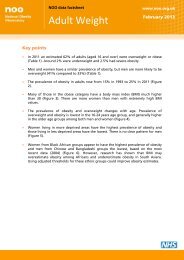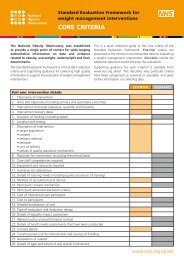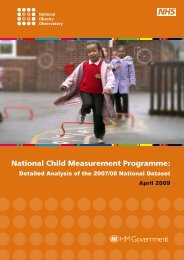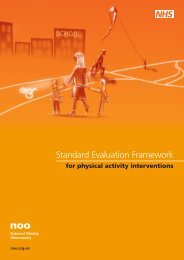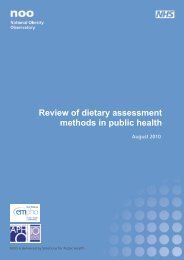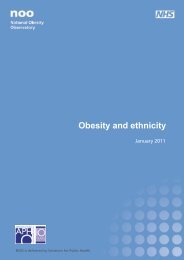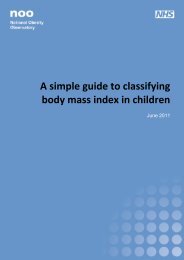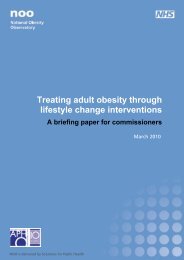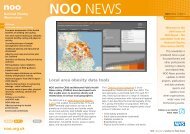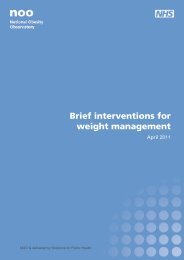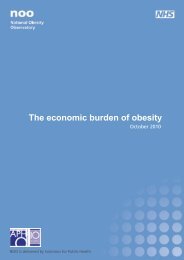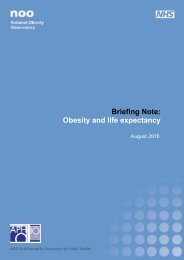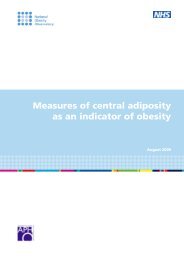Knowledge and attitudes towards healthy eating and physical activity:
Knowledge and attitudes towards healthy eating and physical activity:
Knowledge and attitudes towards healthy eating and physical activity:
Create successful ePaper yourself
Turn your PDF publications into a flip-book with our unique Google optimized e-Paper software.
Section two: children <strong>and</strong> young people<br />
This section refers to data on children <strong>and</strong> young people. There are fewer sources of<br />
data available relating to children than adults. A range of age groups was sampled by<br />
the different surveys, <strong>and</strong> this may impact on responses.<br />
a. <strong>Knowledge</strong>, beliefs <strong>and</strong> self-perceptions relating to diet<br />
This section summarises available data relating to:<br />
• children <strong>and</strong> young people’s knowledge <strong>and</strong> underst<strong>and</strong>ing of what<br />
constitutes a <strong>healthy</strong> diet <strong>and</strong> appraisal of their own diet<br />
• factors influencing <strong>healthy</strong> <strong>eating</strong> in school<br />
Key points<br />
• The majority of children <strong>and</strong> young people consider their diet to be<br />
<strong>healthy</strong>.<br />
• When asked whether or not they have a <strong>healthy</strong> diet, children <strong>and</strong> young<br />
people tend to base their answer on their fruit <strong>and</strong> vegetable consumption.<br />
• 76% of children in school years 6, 8 <strong>and</strong> 10 say the information available to<br />
them about <strong>healthy</strong> <strong>eating</strong> is good enough.<br />
i. <strong>Knowledge</strong> <strong>and</strong> underst<strong>and</strong>ing of what constitutes a <strong>healthy</strong> diet<br />
The Sodexho School Meals <strong>and</strong> Lifestyles Survey 2005 b asked a sample of children <strong>and</strong><br />
young people aged 5 to 7 years <strong>and</strong> 8 to 16 years how <strong>healthy</strong> they believe their diets<br />
to be. The majority thought that their diet was ‘quite <strong>healthy</strong>’ (56% of 5 to 7 year olds;<br />
54% of 8 to 16 year olds) or ‘very <strong>healthy</strong>’ (18% of 5 to 7 year olds; 16% of 8 to 16 year<br />
olds). In contrast, only 1% of 5 to 7 year olds <strong>and</strong> 2% of 8 to 16 year olds thought that<br />
their diets were ‘not at all <strong>healthy</strong>’. The largest difference between the age groups<br />
was seen in those who said their diets were ‘not very <strong>healthy</strong>’ (6% of 5 to 7 year olds<br />
<strong>and</strong> 18% of 8 to 16 year olds). These results are shown in Figure 10.<br />
b The data reported here are from the Sodexho report on the survey, where the number of respondents is not provided.<br />
Therefore it was not possible to calculate confidence intervals.<br />
NOO | <strong>Knowledge</strong> <strong>and</strong> <strong>attitudes</strong> <strong>towards</strong> <strong>healthy</strong> <strong>eating</strong> <strong>and</strong> <strong>physical</strong> <strong>activity</strong>: what the data tell us 20


